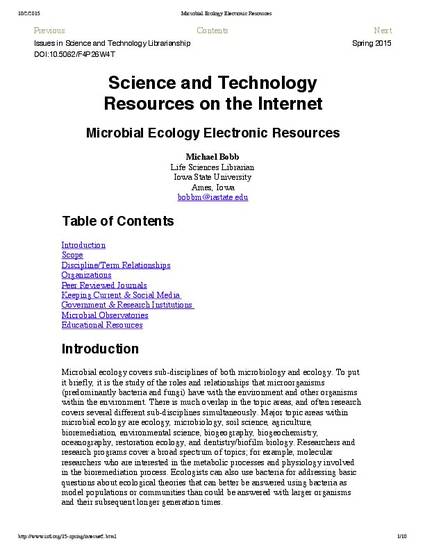
Article
Microbial Ecology Electronic Resources
Issues in Science & Technology Librarianship
Document Type
Article
Disciplines
Publication Version
Published Version
Publication Date
4-1-2015
DOI
10.5062/F4P26W4T
Abstract
Microbial ecology covers sub-disciplines of both microbiology and ecology. To put it briefly, it is the study of the roles and relationships that microorganisms (predominantly bacteria and fungi) have with the environment and other organisms within the environment. There is much overlap in the topic areas, and often research covers several different sub-disciplines simultaneously. Major topic areas within microbial ecology are ecology, microbiology, soil science, agriculture, bioremediation, environmental science, biogeography, biogeochemistry, oceanography, restoration ecology, and dentistry/biofilm biology. Researchers and research programs cover a broad spectrum of topics; for example, molecular researchers who are interested in the metabolic processes and physiology involved in the bioremediation process. Ecologists can also use bacteria for addressing basic questions about ecological theories that can better be answered using bacteria as model populations or communities than could be answered with larger organisms and their subsequent longer generation times.
Rights
This work is licensed under a Creative Commons Attribution 4.0 International License.
Copyright Owner
Michael Bobb
Copyright Date
2015
Language
en
File Format
application/pdf
Citation Information
Michael Bobb. "Microbial Ecology Electronic Resources" Issues in Science & Technology Librarianship Vol. 80 (2015) Available at: http://works.bepress.com/michael-bobb/1/

This article is from Issues in Science & Technology Librarianship 80 (2015), doi:10.5062/F4P26W4T. Posted with permission.